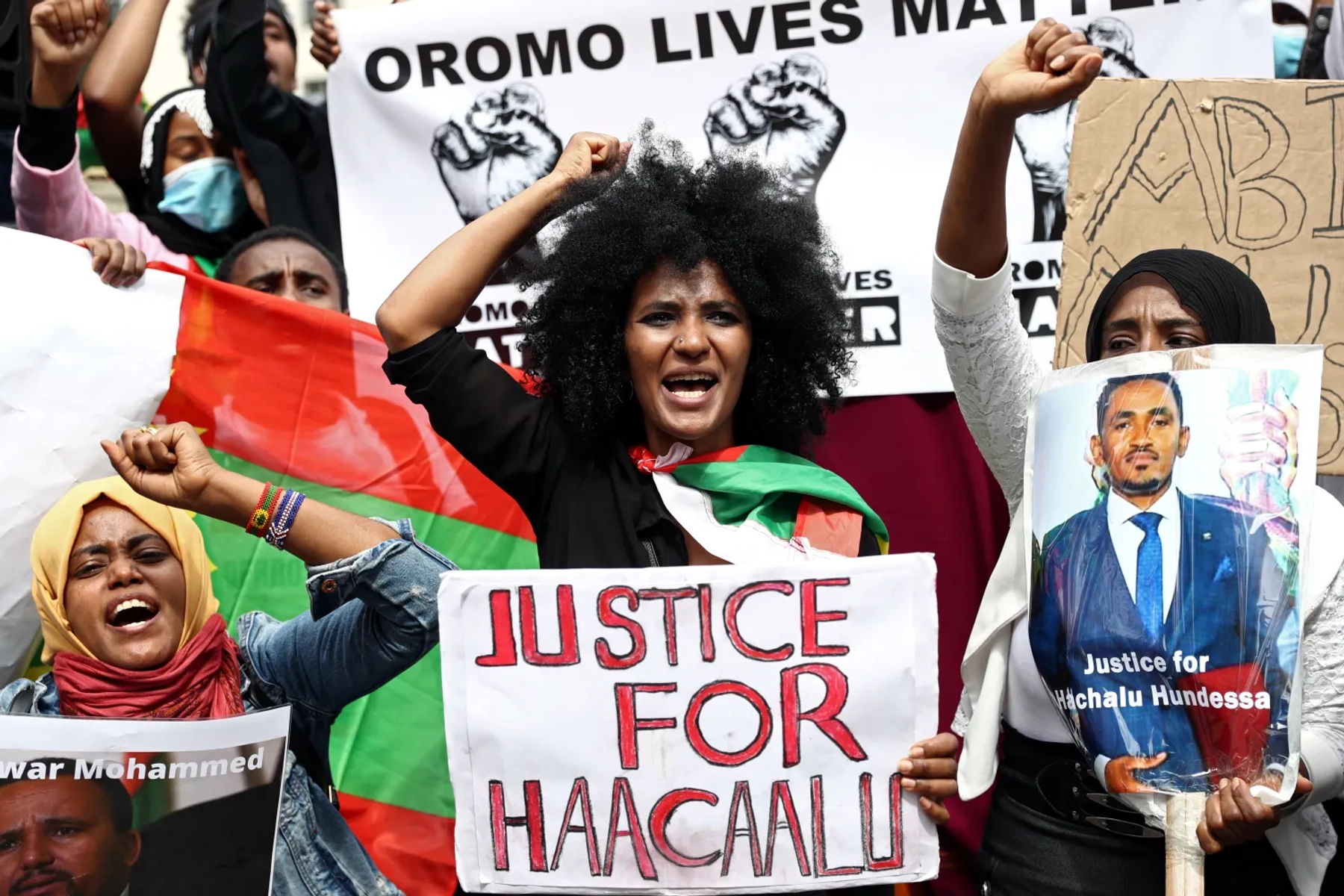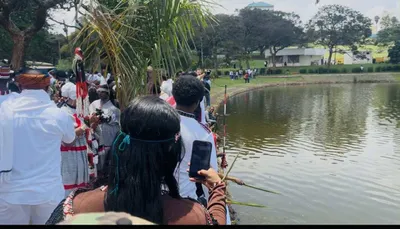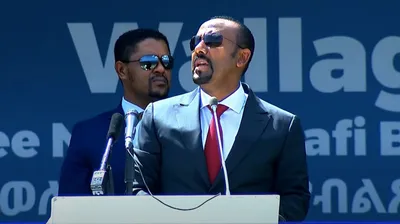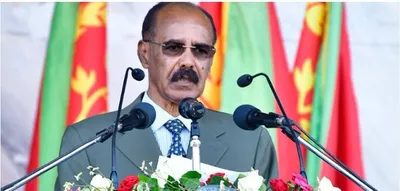Oromo elites need to embark on a soul-searching mission

Oromo community members in UK hold a protest demanding justice for Hachalu Hundessa following his assassination in Ethiopia.
The Oromo quest for justice goes back to the formation of the modern Ethiopian state in the last two decades of the 19th century, when Menilek II of Shewa launched a series of military campaigns that forcibly incorporated previously independent peoples—such as the Oromo—into his emerging empire. Many Oromos sacrificed their precious lives resisting this internal colonization, while others continue to confront the cultural erasure, political and economic marginalization that Menilek’s violent intervention has set in motion. The forms of resistance vary; some fight in the civil and political space, while others take on arms fighting successive regimes with the belief that freedom lost through the gun can only be fully restored by the gun. Still, the Oromo aspiration for freedom, equality and justice is yet to be realized. While several external and internal factors may explain this, what follows is an attempt to provoke a debate on the internal factors that have contributed to the stagnation of the Oromo national movement.
Recently, the Oromo Research Association initiated a research project to publish an Anthology on Finfinnee, with several scholars from different universities in Ethiopia invited to contribute chapters for the planned book. The bigger framework informing the conception of the book was to counter the narrative that claims Finfinnee, with the name Berera, as the capital of Abyssinian King Dawit I (1382 – 1413). Simply put, the Anthology was meant to address Ethiopian elites and Ethiopianist scholars of Ethiopian and non-Ethiopian origin by showing with evidence that prior to being conquered by the Abyssinian king Menelik, Finfinnee served as “principal economic and political headquarter” of the Oromo people.
During one of the several sessions the scholars met to discuss the project, I raised a point of questioning as to whether targeting Ethiopianist elites was the right point of intervention? I argued that the Ethiopianists and their foreign partners know the facts but continue to produce and reproduce narratives that fit their political agenda and this new project may not have any significant impact different from the hundreds of previously published works countering their hegemonic narratives. Instead, I proposed the project should target the Oromo people, especially the elites, who continue to play significant roles in advancing the imperial agenda and in doing so have sabotaged the Oromo people’s quest for freedom, equality and justice.
Developing on this premise, I thought of contributing a separate piece to float the idea for future engagement. This piece, therefore, elaborates on the assertion that some Oromo elites need to embark on a soul-searching mission and reflect on their actions. In other words, the problems that the Oromo people are facing cannot be blamed solely upon the colonizers and the colonial structure they built to sustain their dominance. Doing so is feigning innocence. On this matter, James Baldwin warns, “People who shut their eyes to reality simply invite their own destruction, and anyone who insists on remaining in a state of innocence long after that innocence is dead turns himself into a monster.
As mentioned above, the Oromo resistance against conquest and the struggle for the realization of political independence, economic freedom and social justice was present from the onset of the Ethiopian empire’s colonial project. Thousands have paid with their lives to attain the freedoms the Oromo exercise today, rights that some unfortunately believe were always there to be enjoyed. This kind of complacency is not unique to the Oromo as many, if not all, colonized/oppressed nations at one point or another have gone through similar struggles. For instance, some contemporary Oromo elites contend the current Oromo freedom struggle is no longer necessary. They point to recent developments, such as the demarcation of Oromia’s sovereign boundary, the establishment of Afaan Oromo as an official language of the State and medium of instruction as evidence that the core aspirations of the Oromo have been met. What remains, they claim, is the realization of democracy, a natural, next step that will come once all Ethiopians can freely elect their representatives. Needless to say, this assertion rests on feigned or misplaced optimism.
First, there’s no single historical evidence supporting the argument that empires can be democratized. Second, thousands of Oromo freedom fighters have bled and died, wareegama dhiigaa fi lafee (sacrifice in blood and bone), as the Oromo say, to realize the Oromo people’s right to self-determination, not to democratize the Ethiopian Empire, which successive generations of pro-democracy Ethiopians, including prominent Oromo intellectuals, have attempted and terribly failed to accomplish. The framers of the Oromo liberation struggle were unequivocal from the outset: “An Oromo has no empire to build but a mission to break an imperial yoke.” Therefore, if history is of any guide to us, we need to heed its advice and seek alternatives.
Commenting on why the African-American problem was not solved in the US and where both the blacks and the whites failed, Baldwin writes: “In the context of the Negro problem neither whites nor blacks, for excellent reasons of their own, have the faintest desire to look back; but I think that the past is all that makes the present coherent, and further, that the past will remain horrible for exactly as long as we refuse to assess it honestly.”
In view of this, I argue, the Oromo, especially intellectuals and political leaders, need to engage in serious self-reflection on critical issues of the history, present state, and future direction of the Oromo people. Simply put, we are in a state of confusion, even on surprisingly simple questions of whether or not the Oromo were colonized by the Abyssinian king Menelik. If nothing else, the changing of his title from a king (ruler of an independent country) to an emperor (ruler of empire) following the conquest suggests quite unequivocally what the answer is. As I write this, I remain cognizant of the impact of colonialism in reforming the minds of the colonized people. But I ask, if that change in the natives’ consciousness resulting from the colonial project is an irreversible condition, how did the formerly colonized people from across the world first liberate their minds, or, to borrow from McAdam cognitive liberation and eventually win their political independence? Who, among the trailblazers of the anticolonial struggle and the first generation leaders of post-independent Africa and Asia, were not by and large educated in colonial schools (many in the capitals of their colonizers), convert to their religions, speak their languages and take their names?
Commenting on the challenges African-Americans were facing especially regarding their lack of clarity in how to proceed in their pursuit for freedom, Du Bois introduced a new concept called Double-consciousness: “the sense of always looking at one’s self through the eyes of others, of measuring one’s soul by the tape of a world that looks on in amused contempt and pity. One ever feels his two-ness – an American, a Negro; two souls, two thoughts, two unreconciled strivings; two warring ideals in one dark body, whose dogged strength alone keeps it from being torn asunder.” I do not think the Oromo who disparage Oromo freedom struggles are facing the same struggles. With the African American, the challenge was,
… longing to attain self-conscious manhood, to merge his double self into a better and truer self. In this merging he wishes neither of the older selves to be lost. He would not Africanize America, for America has too much to teach the world and Africa. He would not bleach his Negro soul in a flood of white Americanism, for he knows that Negro blood has a message for the world. He simply wishes to make it possible for a man to be both a Negro and an American, without being cursed and spit upon by his fellows, without having the doors of Opportunity closed roughly in his face.
Unlike an African-American struggling to reconcile double identities because they’re both equally a part of the whole, in the Ethiopianst Oromo case, a person who aspires to become a “true Ethiopian” refuses to recognize his Oromo-ness/Oromummaa – the antithesis of the “Ethiopian” identity, Ethiopiawinet, that the colonial structure has long established.
Although some past failures in the Oromo freedom struggle are the results of a combination of internal and external factors, others may be attributed to the infiltrators that were planted as roadblocks. African-Americans had different names for such agents of the oppressors, and the most fitting in our case is what Wilson termed ‘Screens.’
Conquering and ruling peoples have always found it advantageous, even necessary, to employ individual members of the conquered group to do their bidding and assure their continued rule. The ruling clique of the United States uses this technique on all its national groups with a skill and finesse that the ancients might well envy… whites have had to recruit willing middle-class Negroes to do their dirty work for them, i.e., to keep social unrest under control. These recruited Negroes disarm the victims, blunting their awareness by their similarity of coloration…The recruits function as perfect Screens, camouflaging racism’s unpleasant reality from the victims and from the unfeeling section of the general public as well as from the deeply prejudiced, who would prefer to ignore the facts anyway.
Wilson further describes their values as “patience and long-suffering hard-work, super-patriotism, naïve opportunism, eloquence without relevance – all deeply embedded within a penny-in-the pocket mentality”. The Oromo have long experienced this problem in their struggle for freedom, equality and justice. The Oromo use the metaphor gantuu – “a character that runs away from an expected role – in identifying those who betray the cause they are expected to defend. The equivalent term that accurately describes the social phenomenon of gantuu is quisling.” A person who is gantuu may be friendly, intelligent, a hard worker, and could be from a family with good social standing. The problem is their propensity to betray trust with the ‘intention of harming the original cause.’
A related concept with a similar character is galtuu – a person who cannot build his house, have his own farm and does not do anything on his own, “but depends on another person for his survival… a galtuu survives by providing some sort of service to the family on which he depends. More importantly, his survival always depends on the mercy of that family.” Because these people are so dependent on others for survival, in the context of the Oromo-Ethiopian Empire relationship, the Oromo galtuu were used by the habesha against the interests of the Oromo, namely betraying their own people to gain political and material benefits from the Ethiopian Empire. Tuso uses the Oromo galtuu syndrome to describe this situation.
That is why I believe Oromo intellectuals and political leaders need to engage in serious and honest intellectual debate and address the screens, namely both gantuu and galtuu, among themselves, working toward liberating Oromo minds first in an effort to ultimately restore Oromo agency. Writing on the Oromo, Baxter argued the colonial experience and liberation struggle of the Oromo were unacknowledged problems in the Ethiopian empire. This piece is not to counter Baxter’s thesis but to emphasize it. I ask if we all can agree with Baxter’s observation: that “Ethiopia was, and is now, a ramshackle, though rapidly changing and developing, Empire of which all the members were subjects rather than citizens, but in which almost all the Oromo were colonized subjects.” If we don’t and cannot agree on this fundamental question of existential nature to the Oromo nation, I do not think we can go anywhere because, as Gutema argued in the Introduction to the Anthology on Finfinnee book, ‘The past is the present in some sense…the point of departure is also the point of arrival.’ As the old wisdom advises, ‘if we do not learn from history, we are doomed to repeat it.’
I believe there is still a long journey ahead to address the profound and lasting damage that colonialism has inflicted upon the Oromo people. The first step in this process therefore must be a thorough reckoning with the consequences of colonialism on the Oromo people themselves.
History teaches us that all Empires collapsed because it is not in their nature to democratize. I know there are Oromo elites who do not believe the Oromo were colonized and, as a result, reject the Ethiopian Empire thesis as a false narrative. They are entitled to their views.
In addition to over a century and half of injustices committed against the Oromo, I am cognizant of the unprecedentedly fast deterioration of the security situation and the dismantling of the social, economic and political life of the Oromo in the last few years. Above all, civilian lives are in danger, due to the violence perpetrated by state or non-state actors, which with loose characterization (only for lack of organized data) borders what Mbembe calls necropolitics; the notion he put forward “to account for the various ways in which, in our contemporary world, weapons are deployed in the interest of maximally destroying persons and creating death-worlds – new and unique forms of social existence in which vast populations are subjected to living conditions that confer upon them the status of the living dead.” In his June 16, 2025 article, ‘Ethiopia’s Necropolitical Turn’, Mebratu Kelecha characterized the growing bleak landscape of state violence in Ethiopia as necropower (conversion of politics into a domain of death) and necropolitics (where the regime decides Who is allowed to live.) While this subject requires further exploration, I do not wish to do so here primarily because this piece is intended to provoke introspection among the Oromo.
I concur with Baxter calling for a stronger Oromo unity. I would further qualify it as unity of thought and purpose to secure an Oromia in which peace, freedom, equality and justice are realized for all Oromians, or citizens of Oromia:
… the problem of the Oromo people has been a major and central one in the Ethiopian Empire ever since it was created by Minilik in the last two decades of the nineteenth century. If the Oromo people only obtain a portion of the freedoms which they seek then the balance of political power in Ethiopia will be completely altered. If the Oromo act with unity they must necessarily constitute a powerful force.
Lest we not regret our “innocence long after that innocence is dead”, let’s heed Zalaalam Abarraa’s advice in his compelling poem ‘Utuu’ addressed to ‘warra waan baayye baree waan xino walaalef’ (roughly, for those who knew a lot and are a little confused).
We need your support
We trust you found something of value in this article. If so, we kindly ask you to consider helping Curate Oromia continue its work.
If you believe in the importance of independent voices and honest reporting, we invite you to support our efforts through our GoFundMe campaign.
Every contribution, however small, goes directly to our writers and the expansion of our reach.
Thank you for your support.



